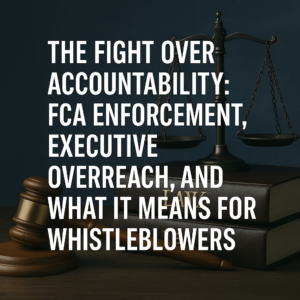March 14, 2025 | Posted By: Emma Doull
 In recent months, a series of legal decisions and executive actions have spotlighted the ongoing tension between the False Claims Act (“FCA”) and executive efforts to limit oversight. For whistleblowers, taxpayers, and ethical contractors, these developments are not just courtroom drama; they represent a shifting legal landscape that may impact the future of fraud enforcement.
In recent months, a series of legal decisions and executive actions have spotlighted the ongoing tension between the False Claims Act (“FCA”) and executive efforts to limit oversight. For whistleblowers, taxpayers, and ethical contractors, these developments are not just courtroom drama; they represent a shifting legal landscape that may impact the future of fraud enforcement.
At Hoyer Law Group, we represent both whistleblowers who risk their livelihoods to expose fraud and companies accused of government fraud. As these recent headlines show, ensuring that fraud is properly punished—and prevented—requires constant vigilance.
What Is the False Claims Act?
The False Claims Act is one of the federal government’s most powerful tools to fight fraud. It allows private individuals (called relators or whistleblowers) to file lawsuits on behalf of the government against companies or individuals that knowingly submit false claims for payment. Violators can be held liable for treble damages and penalties. Learn more about the FCA on the U.S. Department of Justice website.
A String of FCA Cases Shows Courts Are Split on Enforcement
A February 2025 decision from the First Circuit in United States ex rel. Fitzer v. Allergan, Inc. affirmed a strict interpretation of the FCA’s anti-kickback provisions, rejecting an argument that only “explicit” quid pro quo arrangements are illegal. This ruling is a win for whistleblowers: it confirms that subtle or implied forms of kickbacks can trigger liability under the FCA.
Meanwhile, the U.S. Supreme Court recently issued a narrow ruling in United States ex rel. O’Connor v. Network Solutions, Inc., which addressed whether certain procedural violations disqualify claims for government reimbursement. The Court sidestepped broader issues, leaving lower courts divided on how to interpret compliance-based defenses.
In a separate case, United States ex rel. James v. AECOM, a relator suing AECOM under the FCA fought a discovery ruling that could block access to documents necessary to prove the fraud. The case underscores how procedural hurdles can undermine even well-founded whistleblower claims.
The Trump Administration’s Executive Orders and the Threat to Oversight
Simultaneously, the executive branch is grabbing new forms of power under the new administration. These efforts may have implications for FCA enforcement. For example, the wave of Trump-era executive orders aimed at limiting diversity, equity, and inclusion (“DEI”) programs opened up new areas of FCA liability for government contractors. A new area of liability is an obvious concern for companies who do business with the government.
Other efforts are more concerning for relators. In one example, courts found that the administration violated judicial orders to restore previously frozen foreign aid funds—ignoring lawful directives and raising serious questions about compliance with constitutional checks and balances.
Further, the administration’s efforts to expand presidential control over “independent” agencies raised alarms across the legal community. Agencies tasked with overseeing ethics, contracts, and whistleblower protections may now be vulnerable to political interference under this model. For FCA relators, this also matters deeply: if federal agencies are politically neutered or starved of funds, their ability to intervene in qui tam suits or investigate fraud allegations could be crippled.
How These Trends Affect Whistleblowers and Contractors
Whether you’re a government contractor seeking to comply with the law or a whistleblower considering whether to come forward, the consequences of these developments are significant:
- Less Independent Enforcement: If agencies are beholden to political leadership, investigations may be slowed, dropped, or redirected.
- Weaker Oversight = More Fraud: Reduced enforcement invites unscrupulous actors to push the limits.
- Whistleblower Retaliation Risks May Rise: Politically motivated agencies may be less willing to protect or vindicate whistleblowers.
The Good News: Courts Are Pushing Back
Despite these challenges, the judiciary is still serving as a critical safeguard. In multiple rulings this year, judges have ordered the federal government to comply with lawful funding directives and blocked executive orders that threatened DEI initiatives—decisions that reaffirm the principle of checks and balances.
Additionally, FCA jurisprudence is still evolving. The First Circuit’s strong stance on kickbacks, for example, reflects a willingness to uphold whistleblower claims even in nuanced circumstances.
What Should You Do If You Suspect Government Fraud?
Now more than ever, it’s essential to have experienced legal counsel. If you believe your employer or a government contractor is defrauding the government, you may have the right to:
- File a qui tam action under the False Claims Act
- Receive protection from retaliation under whistleblower laws
- Share in any recovery obtained by the government
At Hoyer Law Group, we help whistleblowers understand their rights, evaluate the strength of their claims, and build persuasive cases.
What Should You Do If Your Company Is Suspected of Government Fraud?
Allegations of government fraud—whether through whistleblower complaints, internal reports, or government inquiries—should never be ignored. If your company is under suspicion, it’s essential to respond with transparency, diligence, and legal guidance. The first step is to engage experienced counsel to conduct a privileged internal investigation to determine the scope of the issue. Promptly identifying and addressing potential violations can mitigate liability and demonstrate good faith to regulators. Companies should also preserve relevant documents, avoid retaliating against potential whistleblowers, and consider making a voluntary disclosure when appropriate. At Hoyer Law Group, we assist companies in navigating False Claims Act risks, conducting compliance reviews, and defending investigations with discretion and integrity. Early legal intervention can make the difference between manageable exposure and catastrophic penalties.

